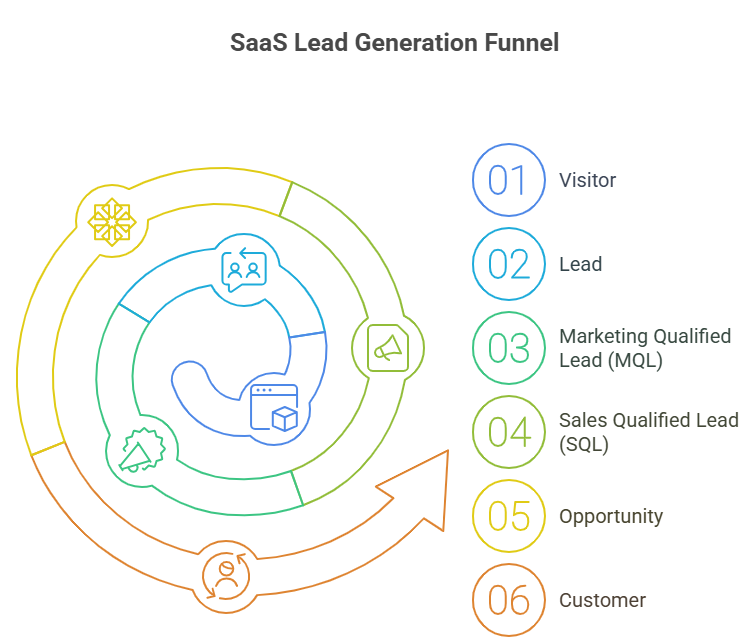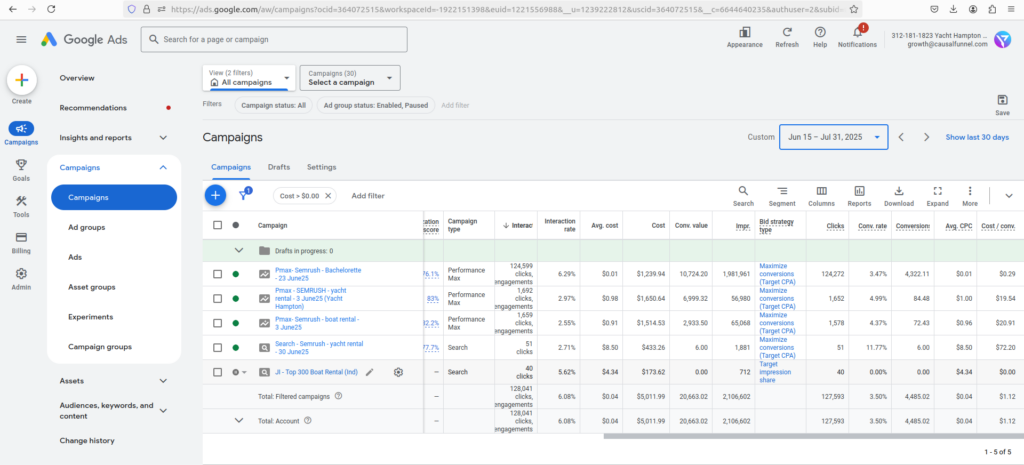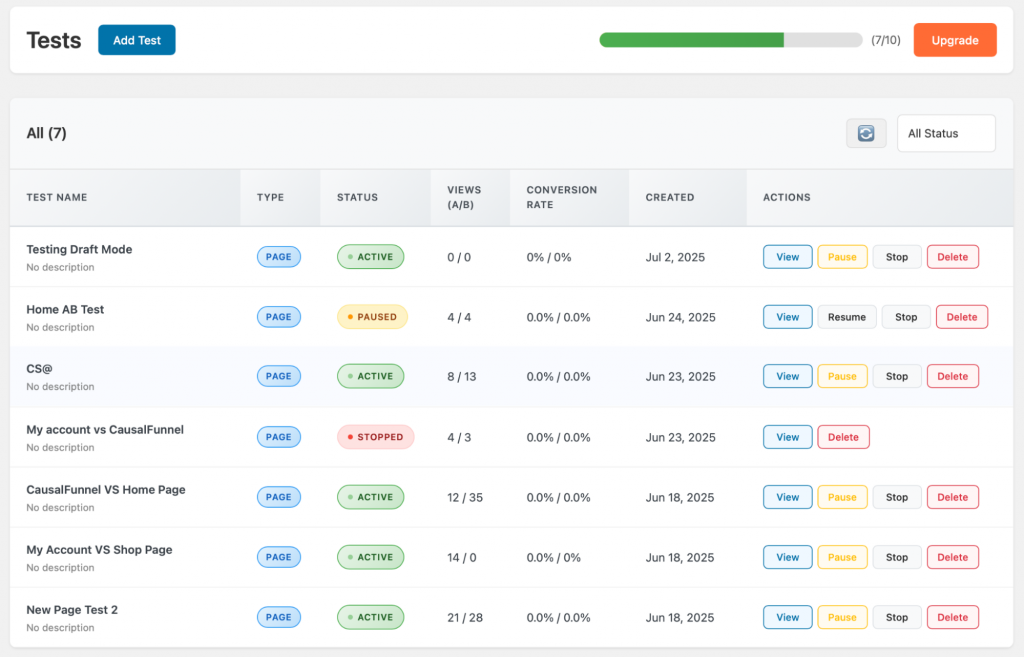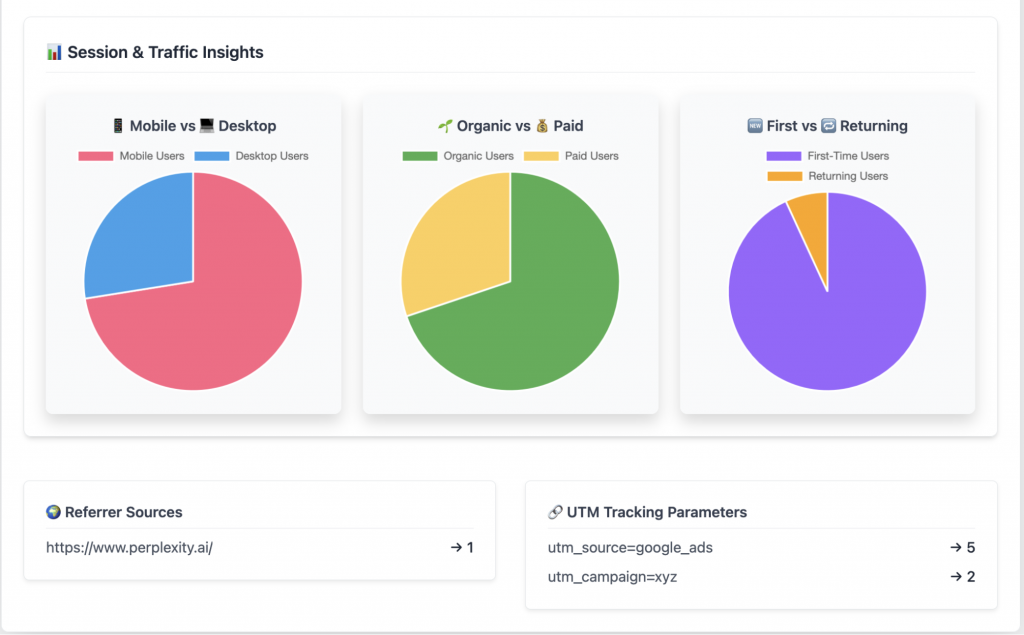What makes a SaaS lead generation funnel effective in 2025? With rising competition and increasingly complex buyer journeys, SaaS lead gen is no longer about just driving traffic. The real challenge is turning that traffic into qualified leads and paying customers through a funnel that actually works.
A well-structured lead generation funnel drives SaaS growth by guiding prospects from awareness to decision while addressing their needs at each step. Yet many teams struggle with fragmented buyer paths, drop-offs at key stages, and unclear performance metrics.
This blog breaks down the latest strategies, proven examples, and critical KPIs that will help you design and refine a SaaS lead generation funnel built to convert in 2025.
A SaaS lead generation funnel, or simply SaaS lead gen funnel, maps the journey prospects take from first discovering your software to becoming paying customers. It helps marketing and sales teams guide and nurture leads through key stages efficiently.

Each of these stages plays a critical role in SaaS lead gen, ensuring prospects move smoothly from awareness to becoming loyal customers.
Unlike traditional sales funnels with a straight path, SaaS buyers often move back and forth between stages. They may re-evaluate their needs, seek detailed product trials, or consult multiple stakeholders before buying. Funnels must flexibly support this zig-zag behavior by providing relevant content and nurturing at every touchpoint.
Recognizing this zig-zag path and building flexible touchpoints is what separates average funnels from effective SaaS lead gen systems.
Typical SaaS funnels see about 2–5% of visitors becoming leads. Of those leads, about 20–30% qualify as MQLs, and 10–20% of MQLs convert to paying customers. These benchmarks vary by niche and company size but provide a useful framework. Tracking these rates highlights where your funnel needs improvement.
Understanding these funnel stages and the fluid nature of SaaS buyer behavior sets the foundation for building a lead generation funnel that truly converts in 2025.
Attracting the right visitors, the ones most likely to convert, is the first critical step in any SaaS lead gen funnel. In 2025, this means optimizing your SEO strategies, creating high-value content, leveraging paid ads and outreach, and using social proof to build trust early.
Search engines now focus heavily on user intent rather than just matching keywords. For SaaS, that means building topic clusters, groups of related content that fully cover a subject.
This helps your site rank for a variety of search queries around a central theme. Targeting long-tail keywords, more specific phrases that show clear buyer intent, brings highly relevant visitors. For example, instead of targeting “project management software,” you might target “best project management software for remote teams.”
Optimizing on-page elements like titles, descriptions, internal links, and page speed remains essential. Structured data helps your content appear in rich search results, improving clickthrough rates.
Creating diverse content attracts different segments of your audience. Blogging drives organic traffic with helpful guides and how-to content. Webinars engage prospects live, while ebooks and whitepapers provide in-depth resources that visitors trade their email for. Offering product demos or free trials within your content creates seamless pathways from interest to action. Use clear CTAs (calls to action) to guide visitors toward the next funnel step.

Paid search, social media ads, and programmatic advertising help reach buyers quickly when organic traffic is building. Use precise targeting based on job roles, company size, or behavior to maximise ROI. Tailored ads reflecting users’ interests increase engagement. Combine this with outbound email or LinkedIn outreach to start conversations proactively.
Blending paid campaigns with outbound tactics ensures your SaaS lead gen strategy doesn’t rely solely on organic growth but maintains a healthy mix of inbound and proactive outreach.
Visitors often rely on reviews, testimonials, and case studies to validate their interest. Displaying social proof prominently on landing pages and in content reassures prospects and reduces hesitation early in the funnel.
Use analytics and behavioural data to qualify early signals of interest. Metrics like time on page, content downloads, or repeat visits indicate warmer prospects. This data helps prioritise outreach and personalise follow-ups, increasing the chances of conversion.
Turning your website visitors into leads is a crucial challenge for SaaS marketers. If visitors arrive but leave without engagement, all the SEO and ads efforts go to waste. The key is creating clear pathways and tools that invite visitors to share their information and begin a relationship.
Your landing page should focus on a single goal with a clear, compelling call to action. Avoid clutter; every element must guide visitors toward taking the next step, whether it’s signing up for a trial or downloading an ebook. Strong headlines that speak directly to visitor needs and benefits grab attention instantly.
Visuals like product screenshots or videos support your message without distracting. Forms should be simple and only ask for the information necessary at that stage to reduce abandonment. Use options like social sign-ins to speed up the process.
Offering valuable lead magnets such as ebooks, webinars, or checklists gives visitors a reason to share their contact info. Interactive tools like live chat or chatbots answer questions in real time and encourage users to engage rather than bounce. These tools create a conversational experience that builds trust and moves visitors closer to becoming leads.
Small changes can make a big difference. Testing variations of headlines, button text, color, or form fields helps you discover what resonates best with your audience. Run continuous A/B tests and use data to refine your landing pages and forms for better conversion rates.
Respect for user privacy is crucial. Clearly inform visitors about data collection, obtain explicit consent, and provide easy options to opt out. Transparency fosters trust and ensures compliance with laws like GDPR and CCPA, which are non-negotiable in 2025.
Qualifying and nurturing leads is a common challenge for SaaS marketers and sales teams. Without a clear process, valuable prospects can slip through the cracks, wasted time is spent on unready buyers, and growth slows. How do successful SaaS companies overcome this bottleneck?
First, it’s vital to define what qualifies a lead as marketing qualified (MQL) or sales qualified (SQL) based on your business. MQLs generally show meaningful engagement and match your ideal customer profile, while SQLs are further vetted by sales as ready for one-to-one conversations. Clear definitions ensure marketing and sales align on who to focus on, avoiding confusion and wasted effort.
Modern SaaS companies use AI powered lead scoring to prioritise efforts. These tools analyse data from multiple sources, such as website visits, email interactions, content downloads, social engagement, and more, to generate a score predicting purchase likelihood. AI dynamically adapts as new data arrives, focusing sales on the hottest leads. For example, a lead who attends a product demo and visits pricing pages scores higher than one who just reads blog posts.
Nurturing isn’t one-size-fits-all. Use data to create personalized, multi-channel campaigns via email, retargeting ads, social media, and live events. Tailor content to specific needs and stages in the funnel, building trust and keeping leads engaged over long SaaS sales cycles.
Seamless collaboration between marketing and sales is key. Share lead data and insights, hold regular alignment meetings, and use integrated CRM tools to track lead status. This ensures qualified leads receive timely, relevant attention, maximizing conversion rates.
Converting demo requests into paying customers remains one of the biggest challenges in SaaS sales. How can you build workflows that move prospects seamlessly from demonstration to decision?
Start by making the demo booking process feel personal and easy. Use clear, benefit-driven messaging and simple forms. Once booked, deliver tailored demos that address specific pain points and use cases. Avoid generic walkthroughs; demonstrate how your product solves the prospect’s unique challenges. Automate reminders and follow-ups to keep engagement high.
After the demo, send personalized follow-ups that reference the conversation and highlight relevant case studies. Sharing real customer success stories builds trust and helps prospects envision the benefits for themselves. Use video testimonials or detailed results data to add credibility.
Offering free trials lets users experience your product risk-free. Support trial users with intuitive onboarding content, checklists, and in-app guidance to help them realize value quickly. The faster they see wins, the more likely they’ll convert.
Anticipate common objections by preparing clear, honest answers. Train sales teams to listen actively and address concerns empathetically. Use urgency signals like limited-time offers or highlighting ROI to accelerate decisions. Closing requires both patience and strategic nudging.
By personalizing demos, nurturing leads thoughtfully, enabling risk-free trials, and addressing objections skillfully, SaaS companies can turn interest into commitment and grow revenues predictably in 2025.
Building and optimising a SaaS lead generation funnel in 2025 demands intelligent, data driven tools that go beyond basic tracking and random guesswork. This is where CausalFunnel steps in, offering an AI-powered platform designed to turn anonymous visitor traffic into steady sales with deep insights and automation.
CausalFunnel’s platform tracks visitor behaviour across multiple sessions and channels using a cookie agnostic approach. This means it overcomes today’s privacy challenges by providing accurate, privacy-friendly attribution without relying on cookies. The result is clear visibility into funnel drop off points at a granular user segment level, enabling precise targeting and personalised nudges that improve visitor to lead conversions.

Experimentation is at the heart of funnel growth. CausalFunnel offers pre-built, customizable A/B testing tools optimized for SaaS use cases. Marketers can quickly create tests and conversion incentives that adjust dynamically based on real-time performance data, removing guesswork and speeding up funnel improvements.

The intuitive dashboard empowers users to visualize each funnel stage live, monitor campaign impact, and identify bottlenecks before they become revenue blockers. AI-driven segmentation pinpoints high-value visitor groups so that marketing and sales can focus efforts on prospects most likely to convert.
Hundreds of businesses leveraging CausalFunnel have measured significant increases in lead capture and conversion rates, reducing CAC and accelerating growth. Additionally, the platform provides expert guidance to help tailor strategies for maximal effect.
For SaaS marketers serious about mastering their lead funnels in 2025, embracing an AI-first, attribution-accurate platform like CausalFunnel is not just an option; it is a smart growth imperative. Gain deeper insights, improve conversions, and stay ahead of the competition, all while respecting data privacy.
Empowering businesses to optimize their conversion funnels with AI-driven insights and automation. Turn traffic into sales with our advanced attribution platform.



